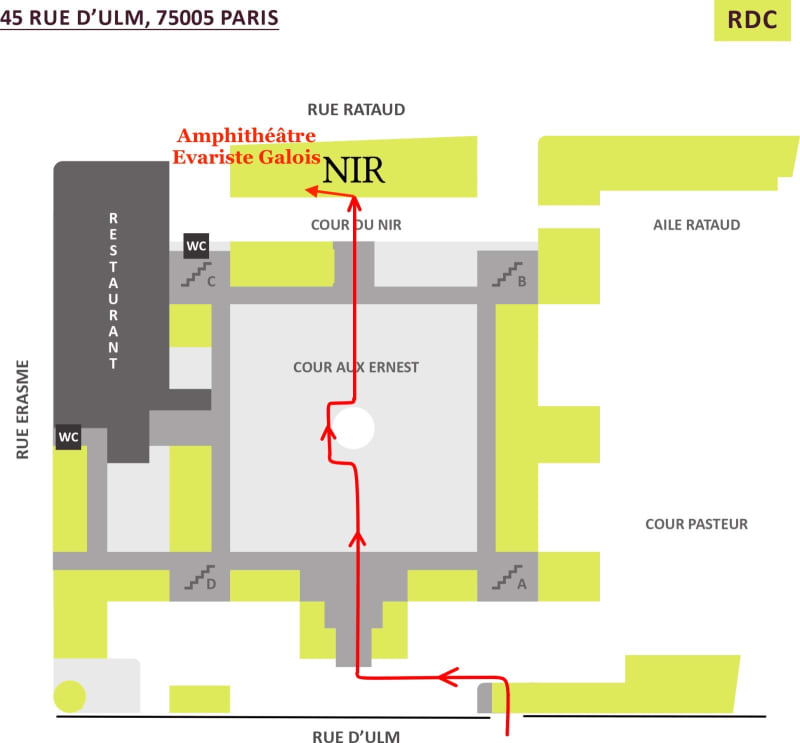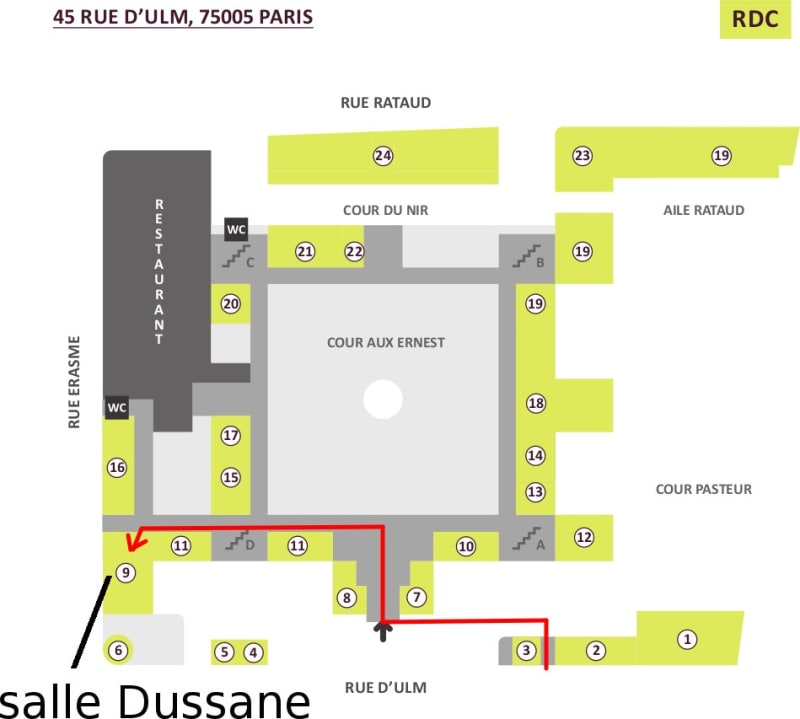Intersecting paths across mathematics, biology, and epistemology: A colloquium in honor of giuseppe longo and ana soto

In this colloquium, we celebrate the 75th birthdays of Giuseppe Longo and Ana Soto. We have chosen to show their distinct trajectories and then how they intersect while working on the foundations of theoretical knowledge with a biology focus. In this respect, both Giuseppe Longo and Ana Soto maintain a close relationship with philosophy and philosophers. At the same time, both are also involved in “the life of the polis”, this is, addressing the repercussions of science in society and the environment, both as scientists and intellectuals.
Intersecting paths across mathematics, biology, and epistemology
A colloquium in honor of Giuseppe Longo and Ana Soto
ÉNS Paris, 21-22 October 2022
Organizers: Maël Montévil, Barbara Bravi and José Antonio Pérez Escobar
In this colloquium, we celebrate the 75th birthdays of Giuseppe Longo and Ana Soto. We have chosen to show their distinct trajectories and then how they intersect while working on the foundations of theoretical knowledge with a biology focus. In this respect, both Giuseppe Longo and Ana Soto maintain a close relationship with philosophy and philosophers. At the same time, both are also involved in "the life of the polis", this is, addressing the repercussions of science in society and the environment, both as scientists and intellectuals.
On the first day, we will discuss a sample of their contributions. Giuseppe Longo is first a mathematician. His work focus on the mathematics and logic of computing while also examining the foundations of mathematics. Together with Francis Bailly he expanded this initial inquiry by examining the foundations of physics, cognitive sciences and biology. His subsequent research has gradually turned towards the epistemology of new interfaces.
Ana Soto is first a biologist, who investigated the control of cell proliferation by hormones. This work, done in partnership with Carlos Sonnenschein, led them to empirical discoveries, notably their pioneering research on endocrine disruptors, and theoretical ones, on the principles necessary to understand the control of cell proliferation, and a new theory of carcinogenesis where cancer is viewed as development gone awry. Thus, Ana Soto's work encompasses experimental and theoretical biology at the frontier between biology and philosophy.
The second day is devoted to Ana's and Giuseppe's joint endeavors. The first morning is devoted to the theory of organisms, a work that took place mainly within the framework of Ana Soto's Blaise Pascal Chair at the Ecole Normale Supérieure, hosted by Giuseppe Longo. The afternoon highlights how they address issues of our time, at the interface of the natural sciences and the humanities. In this light, their work contributes by responding to the urgent need to address the critical state of the biosphere in the Anthropocene.
Language: en, fr
Venue: ÉNS de Paris, 45 rue d'Ulm and online
Online: zoom (email one of the organizers)
21 october: Amphithéâtre Galois (2ième sous sol), 9h30
22 october: Salle Dussane, 9h30
Program
Day 1
Morning - Session 1: The Society of Cells. Chair: Matteo Mossio
09:30 General introduction by the organizers
09:45 Carlos Sonnenschein (Department of Immunology, Tufts University School of Medicine. Associated to Centre Cavaillès)
Daring to ask why and why not?
10:15 Paul-Antoine Miquel (Equipe de Recherche sur les Rationalités Philosophiques et les Savoirs, Université de Toulouse Jean jaurès)
A propos de « la société de cellules », de Soto et Sonnenschein
10:45 Questions to the speakers and Ana Soto
11:00 Break
Morning - Session 2: Foundations of Mathematics and Computing. Chair: Barbara Bravi
11:15 Simone Martini (Università di Bologna Dipartimento di Informatica, Scienza e Ingegneria)
Giving meaning to computations: the birth of a mathematical theory of computation
11:45 Pierre Louis Curien (CNRS emeritus researcher, IRIF, CNRS & Université Paris Cité)
From the semantics of programming languages to the Condorcet paradox.
12:15 Questions to the speakers and Giuseppe Longo
12:30 – 14:00 Lunch
Afternoon - Session 3: Endocrine disruptors. Chair: Mathias Girel
14:00 Introduction by Mathias Girel (Responsable du Centre Cavaillès, Maître de conférences ENS-PSL, UAR 3608 République des Savoirs, ENS-Collège de France-CNRS)
14:10 Barbara Demeneix (in streaming) (Professeure émérite, Physiologie moléculaire et adaptation, UMR 7221, Muséum National d'Histoire Naturelle)
From Wingspread and Even More
14:40 _ Nicolas Cabaton (INRAE, Research Center in Food Toxicology, Université de Toulouse, INRAE, ENVT, INP-Purpan, UPS)
Endocrine disruptors: from their epistemology to our exposome, invading our daily products, until reaching our plates...
15:10 Round table with Ana Soto
15:40 Break
Afternoon - Session 4: Interface of Mathematics with Physics and Biology. Chair: Josè Antonio Perez Escobar
16:00 Short introduction by Josè Antonio Perez Escobar
16:05 Thierry Paul (streaming) (CNRS Laboratoire Ypatia des Sciences Mathématiques and CNRS, Université Paris Cité, Laboratoire Jacques-Louis Lions)
After "Le hasard et la nécessité", the conceptual necessity of randomness and more general presences of mathematics in quantum mechanics
16:35 Josè Antonio Perez Escobar (Centre Cavaillès, UAR 3608 République des Savoirs, ENS-Collège de France-CNRS)
Mathematical counterfactuals and biological understanding: a number of problems and new directions
17:05 Alessandro Sarti (CAMS, CNRS-EHESS)
Assemblage dynamics
17:35 Round table with Giuseppe Longo
18:00 Conclusions
19:00 Dinner for the speakers
Day 2
Morning - Session 5: Theory of Organisms. Chair: Alberto Vianelli
9:30 Short introduction by Maël Montévil
9:40 Angelika Hilbeck (in streaming) (Institute for Integrative Biology in the Department of Environmental Systems Science at ETH Zurich and ENSSER)
Teosinte in Spain - The birth of an invasive species and a missed opportunity
10:10 Denis Noble (in streaming) (Department of Physiology, Anatomy & Genetics, University of Oxford)
A brilliant theory can be destroyed by a single experiment. But does it also happen the other way round?
10:45 Questions to the speakers
10:55 Break
11:10 Matteo Mossio (CNRS, Institut d'histoire et de philosophie des sciences et des techniques, UMR 8590, Paris 1)
Organisms as autonomous systems
11:40 Maël Montévil (CNRS, Centre Cavaillès, UAR 3608 République des Savoirs, ENS-Collège de France-CNRS)
Towards a theory of organisms: state and directions
12:10 Round table on the theory of organism, with: Paul-Antoine Miquel, Carlos Sonnenschein, Maël Montévil, Matteo Mossio, Ana Soto and Giuseppe Longo.
13:00-14:30 Lunch
Afternoon - Session 6: Interface with humanities. Chair: Paul-Antoine Miquel
14:30 Short introduction by Paul-Antoine Miquel
14:35 Jean Lassègue (Centre Georg Simmel - Recherches franco-allemandes en sciences sociales, EHESS, Paris)
How to do science with words - A tribute to Giuseppe Longo's work
15:05 Alain Supiot (Collège de France et à l'Université de Nantes)
tbd
15:35 Questions to the speakers
15:50 Break
Afternoon - Session 7: Taking care of the biosphere. Chair: Marie Chollat
16:10 Introduction by Marie Chollat (Co-vice présidente de l'AAGT, Ingénieure Agroparistech, Docteur en Onco-immunologie)
16:20 Andrea Angelini (EA 4008 - Laboratoire d'études et de recherches sur les logiques contemporaines de la philosophie, Université Paris 8 Vincennes Saint-Denis)
Ecosystème, régulation, santé : un regard critique sur la médecine environnementale
16:50 Marie-Claude Bossière (Pédopsychiatre, Institut de Recherche et d'Innovation)
Disruption relationnelle et développement des jeunes humains d'aujourd'hui
17:20 Round table with Giuseppe Longo and Ana Soto
18:00 Conclusions by Giuseppe Longo and Ana Soto
18:10 Cocktail

